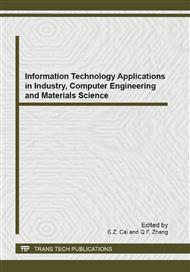[1]
Li Liu, Qingtian Zeng. State-of-the-art of the Question-answering System, Journal of Shandong University of Science and Technology, Volume 26th issue 4th, 73-76, 2007. 10.
Google Scholar
[2]
Qingtian Zeng, Zhongying Zhao, Yongquan Liang. Course Ontology-based User's Knowledge Requirement Acquisition from Behaviors within E-Learning Systems, Computers & Education, Volume 53 , Issue 3 (November 2009) 809–818.
DOI: 10.1016/j.compedu.2009.04.019
Google Scholar
[3]
Dawei Hu, Wei Chen, Qingtian Zeng, Tianyong Hao, Feng Min, Liu Wenyin, Using a User-interactive QA System for Personalized e-Learning, The International Journal of Distance Education Technologies, 6(3), 1-22, July-September (2008).
DOI: 10.4018/jdet.2008070101
Google Scholar
[4]
Tianyong Hao, Dawei Hu, Liu Wenyin, Qingtian Zeng, Semantic Patterns for User-Interactive Question Answering, Concurrency and Computation: Practice and Experience, v 20, n 7, May, 2008, pp.783-799.
DOI: 10.1002/cpe.1273
Google Scholar
[5]
Chen, Wei; Zeng, Qingtian; Wenyin, Liu; Hao, Tianyong, A user reputation model for a user-interactive question answering system, Concurrency Computation Practice and Experience, v 19, n 15, October, 2007, pp.2091-2103.
DOI: 10.1002/cpe.1142
Google Scholar
[6]
Wanpeng Song. The use of Short text similarity computing in user interactive answering system, China Science and Technology University Doctoral Thesis, 19-51, (2010).
Google Scholar
[7]
Shengjun Ji. Sentence Similarity Computing Based on Levenshteindistance Algorithm, Computer Knowledge and Technology,2177-2178,(2009).
Google Scholar
[8]
Jiule Tian, Wei Zhao. Words Similarity Calculation Method Based On TongyiciCiLin. Journal of Jilin University. 603-605,(2010).
Google Scholar
[9]
Rohini Srihari, Wei Li. Information Extraction Supported Question Answering, Proceedings of TREC-8. (1999).
Google Scholar


